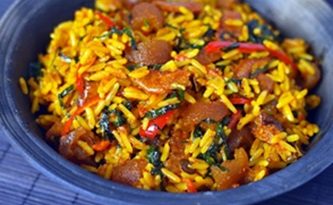Ukpaka/Ugba (African Oil Bean Seed) Amazing Health Benefits
Ukpaka/Ugba (African Oil Bean Seed) Amazing Health Benefits

The African oil bean seed is a nutrient-dense dietary condiment that originated in Eastern Nigeria. It is a nutrient-dense natural food that has remained largely unexplored and underutilized, necessitating rapid attention in order to be fully utilized.
Related >>>>
What’s Ukpaka/Ugba (African Oil Bean Seed)-The Meaning
Ugba, also known as Ukpaka, is the seed of the African oil bean tree. This tree belongs to the Leguminoseae family and grows in the tropics.
The Igbos name it Ugba or Ukpaka, and it’s well-known in Nigeria for the popular salads Ugba and African salad. Other parts of Nigeria, however, call it by different names. It’s known as “apara” by Yorubas and “ukana” by Efiks.
African oil bean is the botanical name for the African oil bean, whereas African oil bean seed is the English name.
Ugba is a common dish in eastern Nigerian cuisine made from sliced African oil bean seeds (Pentaclethra macrophylla).
Fermenting Ugba is essential for making Abacha, nkwobi, soups, and yam vegetables, among other Ugba-related foods.
How to Ferment Ukpaka/Ugba
- Firstly, place the Ugba/Ukpaka slices in a clean basin.
- Then, sprinkle some salt on it and massage it gently.
- After that, keep the dish covered in a warm place for 3-5 days.
- Finally, when it’s done, put it in a zip-lock bag to keep it safe.
Why is Ukpaka/Ugba fermented?
- Unfermented African oil bean seeds were found to contain quantities of paucine, a toxic alkaloid, as well as minor amounts of caffeoylputrescine, according to certain research (which is a growth depressant).
- African oil bean seeds, as well as molds that can cause mycotoxins in foods, have been found in African oil bean seeds. Cooking and fermentation of Ugba assist in the care of these harmful substances.
- Ukpaka that has been fermented has a softer texture and a better flavor. I’ve never tried unfermented Ugba, but it’s supposed to be bitter. Because I haven’t tried it, I can’t say for sure.
Preservation and storage instructions
It’s traditionally wrapped in leaves and sold in the market. Whenever I buy any, I put them in a freezer bag and freeze them.
Ugba that has been frozen might last for months.
The nutritional value of African oil bean seeds (Ugba/Ukpaka)
- Health Benefits of African Oil Bean Seed
Sodium, copper, iron, zinc, potassium, calcium, and magnesium are some of the important nutritional properties found in African oil bean seeds.
It also contains phytochemicals that are advantageous to human health, such as tannins, alkaloids, flavonoids, sterols, glycosides, and saponins.
However, some research has found that the seeds contain anti-nutritive substances such as cyanide, phytate, tannin, and oxalate. However, appropriate fermentation and cooking can help to minimize this anti-nutrient.
Ukpaka/Ugba: A cheap and easily accessible source of a well-balanced diet.
African oil bean seeds are high in energy, protein, amino acids, phosphorus, magnesium, iron, vitamins, calcium, manganese, and copper.
Tannins, alkaloids, flavonoids, sterols, glycosides, and saponins are just a few phytonutrients that can be found in it.
Even the poorest segments of society have access to this readily available and affordable source of essential nutrients.
Please keep in mind that fermentation removes the majority of these critical elements, particularly phosphorus.
Benefits of Ukpaka/Ugba
Here are some of the health benefits of African Oil Bean Seed without wasting any time:
African Oil Bean Seed Benefits
-
Ugba is a nutrient-dense food with a high protein level that also contains fats and oil.
- It includes saponins, which are compounds found in most vegetables, beans, and herbs that have been associated with a reduction in cholesterol levels.
- Treatment for Infertility
According to a study, African oil bean seeds contain phytoestrogens that aid in the treatment of infertility.
- Obesity management
African oil beans are low in calories and can assist you in avoiding getting overweight or obese. Phytoestrogens found in Ugba have been demonstrated to help with weight loss.
- For Dermatology purposes
Because of the African oil bean’s anti-inflammatory characteristics, both the bark and seeds can be used to make a local ointment for treating itches, insect bites, cuts, wounds, and other skin ailments.
- Antihelmintic Effects
Because the bark of the African oil bean tree has antihelmintic characteristics, it can be utilized to make herbal medications for parasitic worm treatment.
- Fighting Cancer
In a local cohort study conducted on Nigerian individuals, Ugba was found to lessen the incidence of cancer.
- Antibacterial Properties
Antibacterial saponins and alkaloids found in African oil bean seeds make them efficient against Bacillus cereus, Staphylococcus aureus, Klebsiella pneumonia, and Bacillus subtilis.
- Epilepsy
In a local investigation, African bean oil was found to lessen both epileptic symptoms and seizure episodes.
- It improves a person’s vision.
It contains Vitamin A, which is beneficial to the eyes and helps improve vision. According to a study, ukpaka lowers the risk of cataracts.
The clouding of the natural eye lens is known as a cataract. People with cloudy eyes frequently collide with things, which might result in blindness. This risk is reduced by Ugba.
- Treatment of Gastrointestinal Diseases
The African oil bean seed’s leaves, stems, and bark can be decocted and used to treat gastrointestinal problems such as diarrhea, dysentery, and irritable bowel syndrome (IBD).
- Leprosy
It does not cure leprosy, but it has been reported to be useful in the treatment of Hansen’s disease wounds.
- It helps you lose weight.
Are you having trouble getting rid of excess fat in your body? Let us discuss the African oil bean seed!
The African oil bean seed is a good source of phytoestrogen, a type of phytochemical that helps you lose weight.
Other African Oil Bean Seed (Ukpaka/Ugba) Health Benefits:
- Prevents gonorrhea
- Convulsions Treatment
- It helps to prevent anemia.
- It helps to prevent anemia.
Other uses of African Bean Oil:
- Commercial benefits
Ugba production is typically a family business that has evolved into an art form that is passed down from generation to generation.
This seed’s oil extract is used to make soaps, candles, and cooking oil. Oil bean seeds are edible and are occasionally encased in brown shells and used for crafts such as bead making. Consumers purchase and use these goods based on their needs.
- Culinary Aims
Ugba seeds can be cooked, sliced, and fermented for three days before being used to make a variety of dishes, including ugba and okporoko, sausages, nkwobi, porridge, Abacha salad, soups, and veggie yam. Ugba, or ukpaka, refers to processed seeds.
Ukpaka pod ashes can be used as local cooking salt, and the seeds can be processed into powdered flour for bread baking.
Pregnancy and Ukpaka
Is it okay to eat Ukpaka or Ugba while pregnant?
There are two schools of thought when it comes to answering this question:
1st school’s opinion is as follows:
No, The African oil bean has been linked to uterine contractions and miscarriage. It is better avoided during pregnancy to be on the safe side, as it has been shown and used in the induction of abortion by some cultures. Stay away from it.
The second school, on the other hand, claims:
For pregnant women and breastfeeding mothers, African oil bean seeds are a cost-effective source of protein and minerals. There is no medical evidence that it is dangerous during pregnancy.
My Point of View
Any health-related advice should be sought from your doctor.
Ukpaka/Ugba Side Effects or Dangers:
It must be fermented before eating.
Despite the seed’s nutritional value, investigations have discovered that unfermented African oil bean seeds contain traces of Paucine, a toxic alkaloid.
Also, bacteria like E. coli and Staphylococcus aureus, as well as molds that can create mycotoxins in foods, small levels of Caffeoylputrescine, a growth suppressant,
As a result, it must go through a thorough fermentation process to remove any undesired toxins before it is ready for eating.
DISCLAIMER
Enjoy the treats, but this essay is not a replacement for medical advice.


